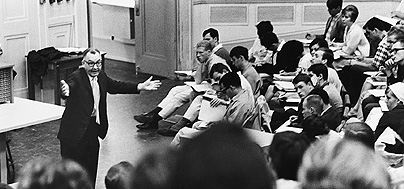 Henry Buechel Henry Buechel
Here's the picture. It's the start of second quarter. You're a sophomore
in the middle of the famous "slump." It's 8 a.m. and very dark.
Hey, it's the middle of winter. You've either had too much coffee to wake
up or not enough to stay awake. You make it to the huge lecture auditorium
in Guggenheim Hall, get a seat as far away from the stage as possible and
hope for the best.
Hope for the best because you've heard of this famous lecturer and his
equally famous class, Economics 201.
Then he enters and begins one of his more notable lectures. It's the
one about the worker in the office of the president of the company, the
one where he wants a raise or better working conditions. Anyway, the president
puts his arm around this man and walks him over to the window, where he
shows him a number of workers lined up for a job. "See all those men,"
Dr. Buechel says, speaking as if he were the president of the story. "They
all want your job. Now, do you think I should give you a raise and improve
working conditions?" And off he goes on employee-management relations
and the history thereof. Finally, after several weeks (which seem like 150
years), we're ready for the next shocker...the Henry Buechel final. It's
something we'd all heard about but never experienced.
It's a test every student on campus knew about even without taking the
course. It consisted of 100 true and false questions. For every one you
got right, you'd get one point. For every one you missed, you got two points
deducted. Theoretically a person could get a negative score. I almost did.
I prepared. I reviewed notes, talked to other guys who had taken the
test before, did some extra reading up, the whole nine yards preparing for
this, the mother of all finals. I had an A going into this final. I got
a C for the course. You figure it out.
Grades aside, it was a course to remember, and I did. Buechel was a great
teacher, a riveting lecturer who would keep more than 200 students enthralled
for 50 minutes three times a week for ten weeks. Then he'd do it all over
again.
Michael Peringer, '57
Seattle | 
